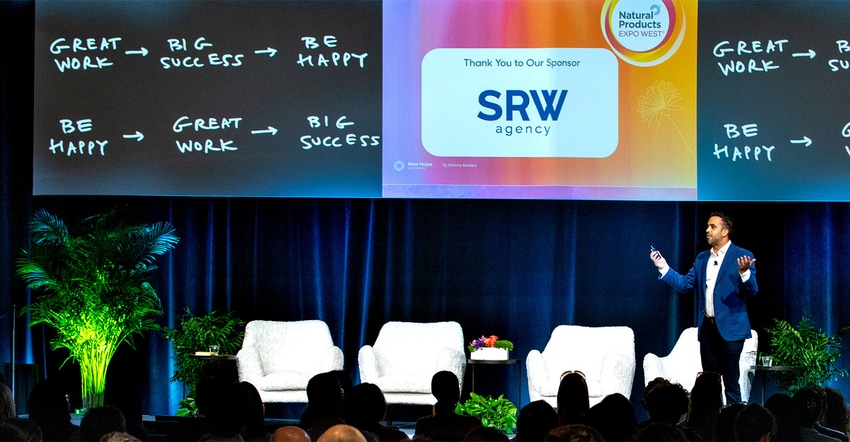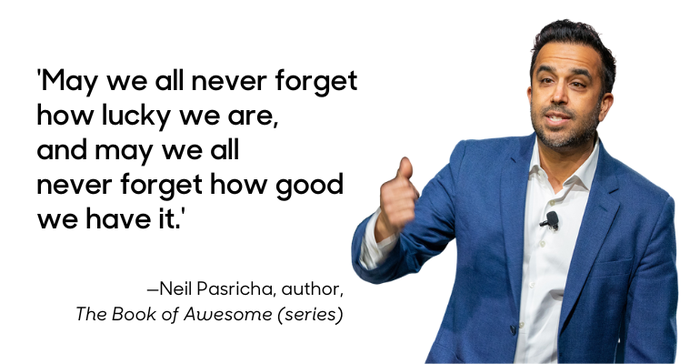March 10, 2023

The stress and overwhelm of modern life—social media, work, politics, COVID-19, the list goes on—are creating record rates of anxiety, depression, loneliness and suicide.
“What is going on here? Don’t we live in the most abundant time ever in human civilization? Why aren’t we happy?”
That's the inquiry from New York Times best-selling author and TED speaker Neil Pasricha, who gave the Natural Products Expo West 2023 keynote speech on March 9.
Pasricha has spent more than a decade researching happiness in a world where happiness has stayed flat, even as income and longevity have increased. He began that in-depth study after two unexpected events: a divorce and his best friend's suicide. As he struggled to bring himself out of his own depression, he started a blog called "1,000 Awesome Things" that soon turned into an internationally acclaimed site.
What Pasricha has found is that despite the gifts modern living provides, people are floundering under the weight of those same modern demands. To that end, he has crafted three quick and simple practices, backed by science, intended to help people reframe their perceptions and experiences and uncover happiness.
According to Pasricha, keeping these practices under two minutes each is key. After all, adding more work to peoples' to-do lists likely will only lead to greater unhappiness.
Also consider that, since 1998, researchers have conducted more than 500 studies on happiness, and authors have published thousands of books on the same subject. That just contributes to the overwhelm, even though those resources aim to make life more enjoyable.
"We've got too much stuff," Pasricha said.
With that in mind, he offered a set of morning, midday and bedtime habits to develop, with the intent of becoming better, not perfect. And sticking to them, Pasricha said, will generate "a disproportionate effect" on happiness.

Two-minute bedtime ritual
Charge and keep your phone at least 20 seconds away from your bed. Not only do bright screens an hour before sleep lead to less melatonin production (essential for healthy sleep), but distractions such as an email from the boss will kick the brain into overdrive. Also, comparing oneself to everyone's achievements on social media foments negative feelings that distract from self-care and deep rest.
"You're always a loser on the internet," Pasricha said.
So do not sleep with your phone nearby, he said. Think about this: If everyone drank wine right before bed and right when getting up—just like we check phones right before bed and getting up—we'd call ourselves alcoholics, he joked.
"We're all phone-aholics now and we don't even see it," Pasricha said. "When everybody has an addiction, no one sees it."
Instead of turning to the phone, read two pages of fiction. Not only does this remove a bright screen before bedtime, but published studies show that reading fiction, particularly literary fiction, opens up empathy, compassion and understanding—three necessary qualities for success in business and personal life. Books, Pasricha said, "help grow the parts of your brain we're not growing today."
Finally, before protesting about not having enough time to read, add up all the time you spend reading emails and Instagram comments, Pasricha said. You'll find you do have the time to read a real book.
Two-minute morning journaling
In the morning, you'll likely encounter some anxiety as you get used to not having your phone within arm's reach. That's the ideal time to put pen to paper and respond to the following Pasricha prompts:
I will let go of …
I am grateful for …
I will focus on …
Be specific with all three. When it comes to letting go of something, Pasricha said that contentedness stems from minimizing regret. Deciding to release a certain issue, fear, limitation or worry will go a long way toward building happiness.
In terms of gratitude, "find one tiny … exact thing" from the last 24 hours to record, Pasricha said, because the brain relives and remembers it. That fosters positive emotions and, studies indicate, also improves physical health.
Lastly, get specific on focus.
"We're all suffering from decision fatigue right now," Pasricha said. "We're always making so many decisions all the time. 'I will focus on' helps you carve one thing you will do from your endless could-do and should-do."
Altogether, these three prompts add up to two minutes, a worthy "investment at the start of your day," Pasricha said.
Two-minute middays
Now what about the middle of the day when anxiety, stress and cortisol have all risen? Pasricha recommends "forest bathing" wherever you live, or taking two minutes to simply go outside. Trees release chemicals that lower the stress hormones cortisol and adrenaline, and sunshine and fresh air do wonders for reviving the body and mind.
'Act yourself into a new way of thinking'
Worried about staying committed to Pasricha's two-minute practices? Tell someone you're going to do them, he said. Vocalizing intent helps face fear and form a new habit.
"It is easier to act yourself into a new way of thinking than to think yourself into a new way of acting," Pasricha said.
In other words, just do it.
"There are simple things we can all do that can help promote happiness and positivity," Pasricha said. "And if you don't want to start, that's fear talking. May we all never forget how lucky we are, and may we all never forget how good we have it."
All Expo West attendees, exhibitors and virtual passholders can watch Neil Pasricha's keynote on the Expo West Virtual virtual page.
About the Author(s)
You May Also Like





